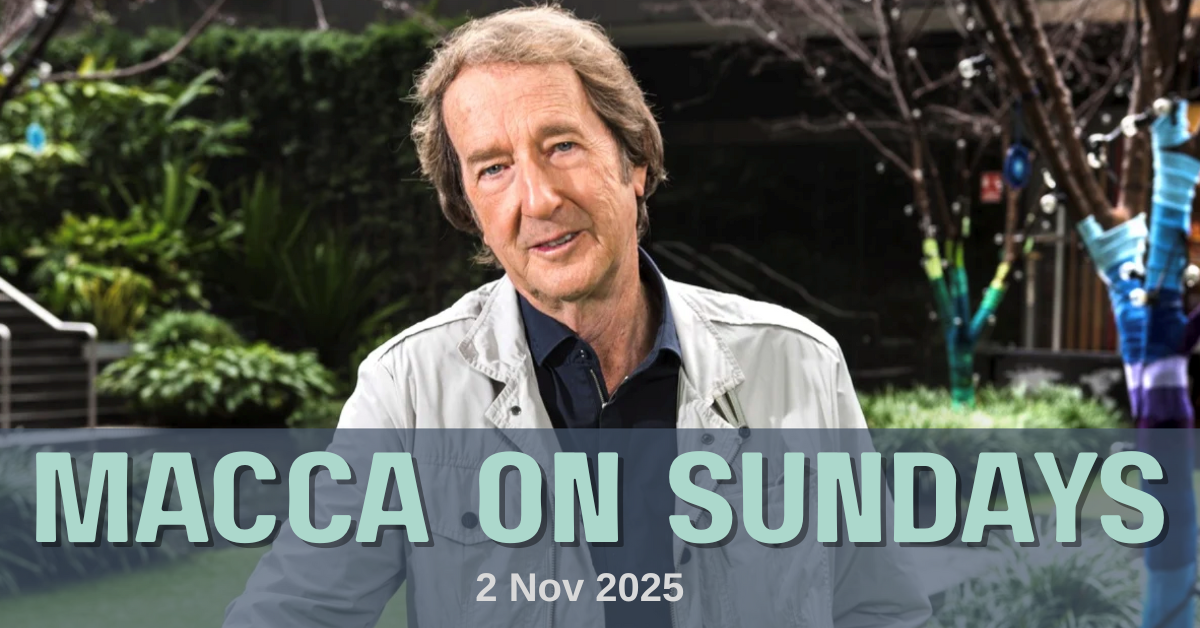
It was another Sunday stitched together the Macca way — easy, curious, and full of life. From Nhulunbuy’s tropical edge to the cool valleys of Yackandandah and the wheat fields of Brookton, callers chimed in with stories of travel, work, music and memory. There were yarns about old cars and missing church bells, about vineyards, fiddles and faraway cemeteries, all bound by the familiar warmth of voices meeting in the early morning.
Dave from Nhulunbuy
The morning began in Arnhem Land, where Dave Mitchell rang from Nhulunbuy to talk about jobs and the future of local industry. “I just wanted to say hello to our friends at Tomago Aluminium Smelter,” he said, lamenting the loss of Australian manufacturing as overseas ownership grows. Macca listened as Dave traced how decisions at the top can ripple through small communities: “Unless we start to look after ourselves a bit better, our grandchildren are going to really suffer.”
Their chat drifted, as Macca’s often do, from heavy themes to lighter ones. Dave reminisced about a young singer Macca once played on air — “You warned us she was unusual, but gee she was enjoyable” — and how musical careers can flare and fade quickly. They laughed about meeting performers in Tamworth and then moved on to Dave’s pride in local success stories. “We’re still rocking along up here with King Stingray,” he said. “They’ve gone from strength to strength.”
Before hanging up, Dave thanked Macca’s unseen crew: “They’re a well-oiled single-sail machine.” He also recalled Macca’s visit to Nhulunbuy back in 1999, when he’d kept a copy of The Yackandanda Panda poem from that trip — a reminder of how long these Sunday voices have been crossing paths.
Andrew from Congarinni
Further south, Andrew was up before dawn shifting cattle near Congarinni, west of Macksville, after returning from Europe. He’d spent time in Normandy, where a visit to an American war cemetery left a deep impression. “It was absolutely stunning, very solemn,” he said. “You can’t turn your back on history — what they achieved over there was incredible.”
He and Macca talked about unity and disunity in the modern world and how Europe still carries the echoes of its past. The tone then lightened when Andrew confessed to a recent “pathetic” motorbike spill near Menindee. A patch of bulldust sent him airborne, and he ended up thanking the “lovely nurses at Menindee District Hospital” and the Royal Flying Doctor Service for piecing him back together.
Ernest on the Newell Highway
Cruising between Jerilderie and Narrandera, Ernest was towing a vintage Alvis car — “A-L-V-I-S, built in Coventry” — and revelling in the quiet of the Newell. “After Spain’s mountain passes and endless roundabouts, it’s lovely driving here,” he said. He’d just finished a touring rally through the Pyrenees and felt grateful to be home, where the horizon stretches “to ground and sky and nothing in between.”
Dennis Jagmic in Perth
Macca’s conversation with Dennis Jagmic stretched longer, the tone that of two old hands swapping stories over the vineyard fence. Jagmic, now a Swan Valley vigneron and accountant, once kept wicket for Western Australia and South Australia during the 1970s. “We were amateurs back then,” he said. “Forty-five dollars for a Shield game — four days’ work — but we loved it.”
He grew up across from Houghton Vineyard, playing backyard cricket with Tony Mann, who would go on to play Test cricket. Later, Jagmic found himself second in line behind Rod Marsh. “Everyone said, you’re wasting your time here, so I went east,” he recalled. After a stint in Adelaide under Ian Chappell’s captaincy, he still rates Chappell “number one — a man’s man, hard but fair.”
These days, his challenges come from a different field. “The wine industry’s had a wild ride,” he said, citing export troubles with China and rising production costs. “I’ve got people from the Pacific Islands working for me now — locals just don’t seem to want to do the manual stuff.” He worries that schools push university over trade and that “determination counts more than a degree.” For Jagmic, whether in cricket or on the vines, “you’ve got to have it in the heart.”
Tricia Flannery of Mangrove Mountain
Children’s author Tricia Flannery started writing during the pandemic, drawing inspiration from the casuarinas on her 70-acre property at Mangrove Mountain. Her self-published series The Adventures of the She-Oak Critters uses real photographs of local flora and fauna. “It’s all Australian,” she said. “I refuse to have them printed overseas.”

She writes for children aged four to ten, encouraging them to look up from screens and into the bush. “So much out there is cartoonish,” she said. “I wanted something real — where they sit around the fire and look at the stars.” Her next book will take the critters from country to city, sailing down the Hawkesbury to the Harbour Bridge. “The bush is spiritual,” she added. “It’s peaceful. Friends come here and feel it straight away.”
Peter Denahy from Yackandandah
Peter Denahy checked in from Yackandandah, still bleary after a U.S. trip. “I lost a day on the way back — the universe owes me October 31,” he joked. He’d spent weeks performing around Tennessee and North Carolina under a new entertainer’s visa, playing Nashville’s legendary Station Inn thanks to Kristy Cox and The French Family Band.
He met bluegrass icons like Larry Cordle, writer of Highway 40 Blues, and James Monroe, son of Bill Monroe. “The musicians are phenomenal,” he said. “Kids over there play fiddle like pros.” For Denahy, the trip was a reminder of why he plays: “It puts a firecracker under you — you come home wanting to write.”
He’ll soon appear at Majors Creek Festival near Canberra and later at the Yackandandah Folk Festival. “They got the songs and the humour,” he laughed. “I just had to explain the word ‘dunny’.”
Jean from Paterson (near Gympie)
Jean Davis, 80, rang to help listeners navigate the Bureau of Meteorology’s redesigned website. “You can still get the old one,” she said cheerfully, giving the link reg.bom.gov.au. The new site, she complained, “took away all the town names.” Macca agreed that sometimes “change for the sake of change” leaves people worse off. Jean hoped that if enough users went back, “they might be wary about turning it off.”
KJ in Blackburn South
Among the most heartfelt calls came from KJ, walking through the early sun in Blackburn South. He arrived from India in 1993, after years working in oil and gas. “Slowly you change and become Australian,” he said. “My heart says this is where I live.”
KJ described the courtesy and openness he’d found in Melbourne, contrasting it with a recent tram encounter where someone told him to “go back.” His calm reply: “This is my country. I’m here.” He spoke too about rapid immigration growth and the importance of balance — “Criticize the policy, not the people.”
Macca called him “my Australian of the Year,” saying KJ’s story captured the essence of belonging. “We’re all Australian-made,” Macca said, echoing the old song.
Tim from Mollymook
Driving home from Kangaroo Valley, Tim smiled about an evening spent playing cards with his grandchildren. “These kids don’t use devices,” he said. “They made up a game with three cards in five minutes.” For him, a deck of cards teaches imagination, patience and arithmetic — “a one-stop shop.” Macca agreed: small games, big lessons.
Cheryl from the Blue Mountains
Long-time racing fan Cheryl called ahead of Melbourne Cup Day, relishing the theatre of it all. A former costume-maker, she loves “the whole spectacle” but treats it like a science. “You whittle them down — horses that don’t stay 2,500 metres can’t win,” she said. She praised jockeys Jamie Kah and Rachel King and promised to study the form once the weather settled.
Cara in the Hunter Valley
Cara, once from St Kilda and now in the Hunter Valley, phoned with her Cup tips and a memory of saving a stranded Christmas beetle — “fed her up for nine days and let her go.” Expecting a wet track, she fancied Flatten the Curve, winner of the Bowling Green Gold Cup in Kentucky, and Half Yours, ridden by Jamie Kah. “It’s the race that stops the nation,” she said. “Everyone comes together for it.”
Brian on Bribie Island
Brian remembered attending the 1971 Melbourne Cup with friends, carrying eskies of champagne, beer and Kentucky Fried Chicken straight onto the lawn. At the time, he was working on the tunnel under Arthur’s Seat for the Melbourne Sewerage Scheme. “We just spread out rugs in front of the main stand — you couldn’t do that now,” he laughed.
He’s lived on Bribie Island for nearly 30 years and still loves a flutter. This year he’s backing Absurd. “I came over from New Zealand, sold everything, and never looked back.”
Jan from Brookton, WA
In Brookton, Jan reported a strange theft: both the Anglican and Catholic church bells had vanished. “The Anglican bell had hung there 130 years,” she said. “The Catholic one for 70.” Fearing they’d been stolen for scrap, she appealed for their return. Macca mentioned Peter Olds’ foundry in Maryborough, one of the few places still casting new bells, but Jan said that wasn’t the point — “They were gifts to the community.”
Richard on the Road to Melbourne
Truck driver Richard was hauling two huge tractors south from Far North Queensland. “It’s lush up here,” he said, after chatting with cheerful service-station staff that morning. He noted that Australia’s population had grown by 1.25 million in two years, then joked that many were now living on wheels: “We’re not house-os or wheel-os — we’re wheelies living in our bloody vehicles.”
Richard also carted vintage Studebaker army trucks built under the 1945 Lend-Lease Program, and finished his call with a grin about a lucky $61 bet that came good at the marina bar.
Joan from Skye
The last call of the show came from Joan in Skye, still glowing from Derby Day at Flemington. “The fashions were beautiful — lots of black and white,” she said. She’d met Michelle Payne — “a beautiful young woman” — and watched Pride of Jenny win by ten lengths. “Sometimes I just make up my mind and go,” she laughed. “The roses, the weather, the people — it’s wonderful.”
Ordinary Sunday Doing Extraordinary Things
From Nhulunbuy’s red earth to Brookton’s wheat fields, from Yackandandah’s fiddles to a truck stop near Hay, the voices on Macca’s show carried the sound of a country still connected by conversation. These callers spoke of work and weather, of bells gone missing and beetles saved, of old cars and new songs, of belonging and gratitude.
What ties them together isn’t distance or background but attitude — that easy warmth that starts with “G’day.” Week after week, Australia All Over reminds us that ordinary people, simply telling their stories, make the nation extraordinary.
Listen to the podcast episode here.
Disclaimer: ‘Australia All Over’ is a program produced and broadcast by the ABC Local Radio Network and hosted by Ian McNamara. Brisbane Suburbs Online News has no affiliation with Ian McNamara, the ABC, or the ‘Australia All Over’ program. This weekly review is an independent summary based on publicly available episodes. All original content and recordings remain the property of the ABC. Our summaries are written in our own words and are intended for commentary and review purposes only. Readers can listen to the full episodes via the official ABC platforms.





